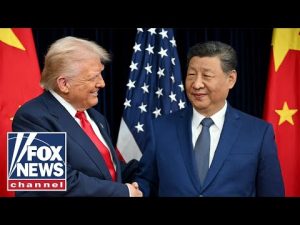President Donald Trump met with Chinese leader Xi Jinping in Busan, South Korea on October 30, 2025, in a high-stakes bilateral that took place on the margins of the APEC summit. It was their first face-to-face meeting since 2019, and the encounter immediately produced headlines and a sense that Washington’s blunt, America-first diplomacy had rattled Beijing.
What came out of the meeting was striking: the two sides agreed to pause China’s new rare-earth export restrictions for a year, China signaled it would resume large purchases of U.S. soybeans and energy, and Washington agreed to roll back a threatened tariff escalation — including a reduction in certain fentanyl-related tariffs. Those concessions did not appear out of thin air; they followed intense negotiations and public pressure from the United States.
Patriots should be clear-eyed about what this means: President Trump used hard leverage — including the credible threat of 100 percent tariffs — to force Beijing to make concrete, actionable commitments. Diplomacy backed by muscle gets results, and this White House showed it would not be bullied into meek appeasement.
Still, no one who loves America should forget that promises from the Chinese Communist Party must be verified, not merely applauded. The agreement is reportedly time-limited and slated for regular review, which is exactly what a cautious, sober America should demand before loosening pressure on Beijing.
Washington must now move from photo-ops to enforcement, and Congress should insist on ironclad verification mechanisms and penalties for backsliding. Markets breathed easier after the meeting, but national security and supply-chain resilience cannot be left to press releases and warm smiles from state media.
Rare earths are not a bargaining chip for naive diplomacy — they are the backbone of modern defense, electronics, and clean-energy technologies, and any deal that secures American access while protecting U.S. industry is a strategic win. If this agreement holds and is monitored closely, it will be because a tough stance forced Beijing to choose cooperation over further economic brinksmanship.
Americans who work for a living should cheer a president who puts country before commerce deals that empower our adversaries. But cheering must be followed by oversight: demand transparency, demand inspections, and demand consequences if Xi or his regime fails to follow through. That is how a free nation protects its people, its industries, and its future.







